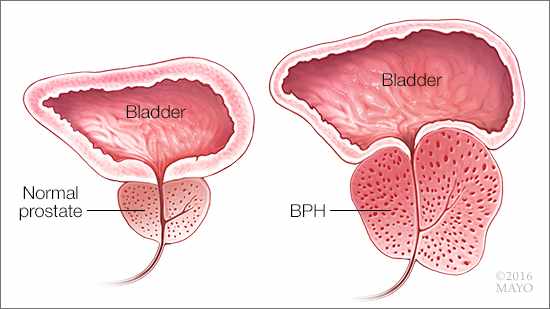-
Featured News
Mayo Clinic Q and A: Asymptomatic benign prostatic hypertrophy — OK to watch and wait?

DEAR MAYO CLINIC: I was diagnosed with benign prostatic hypertrophy last year, and my doctor said at the time that there was no need for immediate treatment. Is it OK to wait to see a doctor again until symptoms appear, or would that be too late? Does treatment for it mean I will need surgery?
ANSWER: When benign prostatic hypertrophy, or BPH, doesn’t cause any symptoms, it’s fine to postpone treatment. If you begin to notice urinary symptoms, though, talk to your doctor. Typically, treatment is based on how bothersome symptoms are and how much they affect your daily activities. Surgery may be necessary to treat BPH in some cases, but medication generally is used first and is often effective in successfully managing this condition.
BPH is enlargement of the prostate gland that’s not related to cancer. It’s a common condition in men as they age. BPH may cause symptoms such as a frequent or urgent need to urinate, difficulty starting urination, weak urine stream, a stream that stops and starts, increased urination at night, or inability to empty the bladder completely.
BPH tends to progress over time as the prostate grows larger. Not everyone diagnosed with BPH develops symptoms, though, and the size of the prostate is not necessarily linked to specific symptoms. For example, some men with only slightly enlarged prostates may have significant symptoms, while other men with substantially enlarged prostates have only minor urinary symptoms. In some cases of BPH, symptoms eventually stabilize and may even improve over time.
Treatment for BPH is focused on managing symptoms, so delaying treatment until symptoms appear won’t negatively affect the outcome of that treatment. Some men with only mild symptoms opt not to have any treatment.
Self-care steps, such as limiting beverages in the evening, scheduling regular bathroom breaks throughout the day, limiting alcohol and caffeine, exercising regularly and eating a healthy diet, can be useful in controlling mild BPH. If symptoms begin to interfere with your daily routines, it’s likely your doctor will recommend treatment for BPH.
Medication is the most common treatment for mild to moderate BPH. Your doctor may prescribe a drug from a class of medications called alpha blockers. They relax bladder neck muscles and muscle fibers in the prostate, making urination easier. Another group of medications, called 5-alpha reductase inhibitors, can be used to shrink your prostate by preventing hormonal changes that cause prostate growth. In some cases, taking an alpha blocker and a 5-alpha reductase inhibitor at the same time can be helpful if those medications alone aren’t effective.
If BPH symptoms become severe, or if medication is not enough to manage your symptoms, a surgical procedure may be recommended. A variety of procedures can be used to treat BPH. Most of them involve removing or destroying excess prostate tissue.
Possible side effects from prostate surgery depend on the type of procedure you have. In general, complications may include temporary difficulty with urination, urinary tract infection, bleeding, semen flowing backward into the bladder instead of out through the penis during ejaculation, erectile dysfunction, and, very rarely, loss of bladder control.
At this time, however, you don’t need to make any treatment decisions. Monitor your condition, and if you begin to notice any urinary symptoms, talk to your doctor. The two of you can then decide how best to manage BPH going forward. — Dr. Todd Igel, Urology, Mayo Clinic, Jacksonville, Florida







